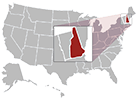
Perhaps you’ve considered a career in the veterinary industry.
Read this guide to find out what you must do to become a vet technician in the state of New Hampshire!
Page Navigation
- Veterinary Technician Job Description and Duties in New Hampshire
- Education and Training Required for Veterinary Technicians in New Hampshire
- Becoming a Licensed Veterinary Technician in New Hampshire
- Employment and Salaries for Veterinary Technicians in New Hampshire
- Additional Information for Veterinary Technicians in New Hampshire
Veterinary Technician Job Description and Duties in New Hampshire
As a vet tech, you’ll receive various tasks from the licensed veterinarian for which you’ll work.
These tasks include:
- Administering medications
- Taking x-rays,
- Processing tissue samples,
- Assisting in surgery and emergency care
- Performing lab tests
- Teeth cleaning,
- Electrocardiography,
- Bandaging,
- Wound cleaning,
- Maintaining detailed and accurate records
- Of meds, supplies, patients
You will not be allowed to perform surgeries nor to prescribe meds while you are a veterinary tech.
Education and Training Required for Veterinary Technicians in New Hampshire
In New Hampshire, like in several other states, you’re not required to become licensed to get hired for this position.
Keep in mind that both previous experience in the field and certification will be highly appreciated by your future employer.
To become certified, you will need to get a degree first.
You can obtain either an Associate’s or a Bachelor’s degree in Applied Science specializing in veterinary technology.
For this, you need to search for training programs that received accreditation from the American Veterinary Medical Association.
Your training will be at least 2 years long and can last for up to 4 years, depending on the chosen degree.
Externships, internships, or preceptorships will commonly provide your mandatory field training.
This field practice period varies based on the program.
You’ll usually be in charge of finding such opportunities and the site needs to be approved.
These are the New Hampshire schools where you can enroll.
Top 2 Schools in New Hampshire
| School Name | Address |
|---|---|
| Great Bay Community College | 320 Corporate Drive Portsmouth, NH 03801 |
| University of New Hampshire | 104A Barton Hall Durham, NH 03824 |
Keep in mind that online training is possible, with the exception of field training that has to be completed as usual.
With online learning, you’ll also have to figure out a way to attend the mandatory examinations for the classes.
It is very common to be asked for the following when applying to a program:
- Being at least 18 years old
- Having a high school diploma or GED
- Your test scores on ACT, SAT, or Accuplacer
- Minimum a grade of C in these subjects: biology, English composition, math, basic computer science, psychology, humanities, and public speaking
- Future students must complete these classes right before the first semester of the program.
- 2 letters of recommendation
- One must come from a veterinarian.
- Health insurance
- Buying a medical malpractice policy
- Passing an interview
- 360 hours of previous practical experience
The grades must be high because veterinary technology programs have a limited number of spots available.
There are various solutions available to those who find the tuition to be too high, such as loans, grants, and even scholarships.
Here are some of the subjects you’ll study:
- Introduction to veterinary technology
- Anatomy and physiology
- Emergency care and first aid
- Pathology
- Anesthesiology
- Radiology
- Immunology
- Pharmacology
- Parasitology
- Toxicology
- Nutrition
Becoming a Licensed Veterinary Technician in New Hampshire
Once you graduate, you have up to 1 year to pass the Veterinary Technician National Examination.
This is the exam that will bring you the license that can be used across the nation to get hired as a veterinary technician.
For the exam, you’ll need:
- An application form
- School transcripts
- To pay a fee
- $300 for the exam
- $100 for the license
- Score at least 70% on the VTNE
This test lasts for 3 hours and has 150 questions.
The certification must be maintained current every year by sending in a renewal application, a fee, and proving you completed 12 hours of continuing education.
Employment and Salaries for Veterinary Technicians in New Hampshire
You probably want to learn more about your potential workplace and salary.
You can find a job in these type of institutions:
- Private clinical practices
- Zoos
- Veterinary teaching hospitals
- Rescue centers
- Wildlife or exotic animal rehabilitation centers
- Humane societies,
- Research facilities,
- Feedlots,
- Pharmaceutical companies
You might want to know the best employers of veterinary technicians in New Hampshire, so here they are:
- Veterinary Emergency Medical Center of Manchester
- Capital Area Veterinary Emergency Services, Concord
- Brentwood Country Animal Hospital, Exeter
- Southern New Hampshire Veterinary Referral Hospital, Manchester
- Granite State Animal Hospital, LLC, Windham
Below you can see the average salaries for this occupation, across the major cities in this state.
Annual Salary Range:Average Salary of Veterinary Technicians in New Hampshire
| City Name | Salary |
|---|---|
| Manchester | $38,025 |
| Nashua | $40,175 |
| Concord | $38,248 |
| Derry | $39,057 |
| Rochester | $37,796 |
| Salem | $39,582 |
| Dover | $37,951 |
| Merrimack | $40,175 |
| Londonderry | $40,175 |
| Hudson | $40,175 |
Additional Information for Veterinary Technicians in New Hampshire
It’s very important and easy to stay updated with news in the industry, with these resources:
- New Hampshire Veterinary Medical Association
- New Hampshire Veterinary Technician Association
- National Association of Veterinary Technicians in America
- Veterinary Career Network
- Vet Tech Life
- Where Techs Connect




